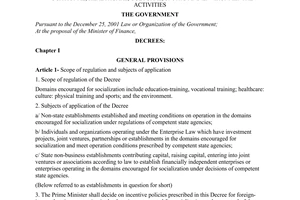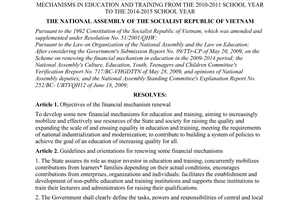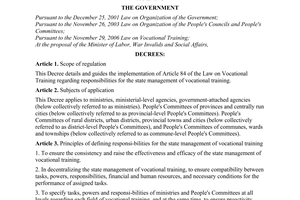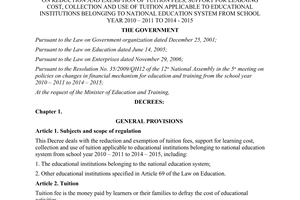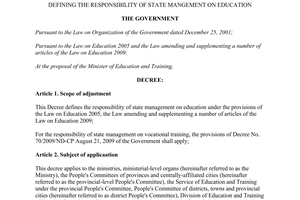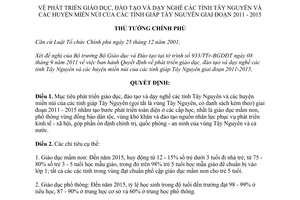Nội dung toàn văn Decision No. 1951/QD-TTg on development of education, training and vocational
|
THE
PRIME MINISTER |
SOCIALIST
REPUBLIC OF VIET NAM |
|
No. 1951/QD-TTg |
Hanoi, November 02, 2011 |
DECISION
ON DEVELOPMENT OF EDUCATION, TRAINING AND VOCATIONAL TRAINING IN CENTRAL HIGHLANDS PROVINCES AND MOUNTAINOUS DISTRICTS OF PROVINCES BORDERING ON THE CENTRAL HIGHLANDS IN THE 2011- 2015 PERIOD
THE PRIME MINISTER
Pursuant to the December 25, 2001 Law on Organization of the Government;
At the proposal of the Minister of Education and Training in Report No. 933/TTr-BGDDT of September 8, 2011, on the issuance of a decision on development of education, training and vocational training in Central Highlands provinces and mountainous districts of provinces bordering on the Central Highlands in the 2011- 2015 period,
DECIDES:
Article 1. The development of education, training and vocational training in Central Highlands provinces and mountainous districts of provinces bordering on the Central Highlands (referred to as the Central Highlands region for short, with enclosed list) in the 2011- 2015 period aims to create a step of comprehensive development at all educational levels, particularly preschool and general education in ethnic minority and difficulty-hit areas, and to train human resources for socio-economic development, contributing to political stability, defense and security of the Central Highlands region and the whole country.
Article 2. Specific targets:
1. Preschool education: By 2015, to mobilize 12-15% of under-three children to nurseries; 75-80% of children aged 3-5 years to kindergartens, of which over 98% of five-year-old children to kindergartens in preparation for their first grade; all provinces in the region will reach the standards of preschool education universalization for five-year-old children.
2. General education: By 2015, the rates of children of eligible school age attending primary schools, lower secondary schools and upper secondary school will reach 98-99%, 87-90% and 60%, respectively.
3. Education for ethnic minority people: By 2015, 100% of districts inhabited by large numbers of ethnic minority people will have boarding general schools for ethnic minority children; 7- 9% of total ethnic minority secondary school pupils will be enrolled to boarding schools; 96-98% of five-year-old ethnic minority children will be good at Vietnamese before becoming first graders.
4. Intermediate vocational education: By 2015,5-7 intermediate vocational schools will be additionally set up; the rate of laborers with intermediate professional qualifications will account for 14% of total trained laborers; 5- 8% of lower secondary school graduates will be enrolled in vocational intermediate schools.
5. Vocational training: By 2015, the rate of vocationally trained laborers will reach 35%; there will be 5 vocational colleges and 15 vocational intermediate schools in the whole region and at least one vocational training center in each district; vocational guidance will be properly provided so as to attract 5-7% of lower secondary school graduates into vocational training.
6. University education: By 2015, there will be an average of 180 students per 10,000 inhabitants; two more universities (including a private one) and 4 more colleges will be established; the rate of ethnic minority students will be 18-20% or higher of the total number of university and college students in the whole region.
7. Continuing education: By 2015, more district-level continuing education centers and community-based learning centers will be set up so that all district-level units will have their own continuing education centers and 90% of communes and wards will have community-based learning centers; the rate of literate people aged 15 years or higher will be 96%.
Article 3. Major solutions for the development of education, training and vocational training in the Central Highlands region
1. To complete the school network, solidify and standardize physical foundations of schools at all levels, create favorable conditions for school goers and meet the requirements of raising educational quality.
a/ Preschool education:
- To fully implement policies toward preschool education establishments under the Prime Minister's Decision No.60/2011/QD-TTg of October 26, 2011, providing for a number of policies on preschool education development in the 2011- 2015 period, aiming to ensure land areas and increase investment capital for development of preschool schools in all communes; first of all to give priority to the construction of schools in remote villages and hamlets and areas inhabited by large numbers of ethnic minority people and the construction of new preschools in communes without such establishments.
- To build adequate classrooms, functional rooms and essential supporting facilities toward building standard school physical foundations; to ensure adequate equipment and toys according to prescribed standard; to give priority to building physical foundations for the universalization of preschool education for five-year-old children.
b/ General education:
- Provinces and districts in the region shall scrutinize for adjustment and supplementation their school network master plans to meet the development requirements of the 2011-2015 period, creating favorable conditions for pupils to go to school and raise the percentage of school goers.
- To further implement the program on solidification of schools and classrooms and the national target program on education and training; to mobilize and incorporate funding sources from other programs and projects for realization of the school and classroom network master plans, incrementally build standard school physical foundations and raise the rate of schools reaching the national standards.
- To focus on directing the implementation of Prime Minister decisions on educational development in order to consolidate and expand provincial and district ethnic minority boarding general schools in areas inhabited by large numbers of ethnic minority people; to prioritize investment in semi-boarding general schools for ethnic minority pupils, ensuring conditions for daily-life activities of semi-boarding pupils; to build dormitories for boarding upper secondary school ethnic minority pupils in difficulty-hit areas. To invest in synchronous physical foundations for schools and official-duty houses for teachers in border communes and areas inhabited by large numbers of ethnic minority people, ensuring welfare development, political stability, defense and security maintenance.
c/ Continuing education:
To complete the network of district-level continuing education centers with multiple functions, organizing separate continuing education, vocational guidance and vocational training centers or combined ones, depending on specific conditions of each locality; to enhance physical foundations and teaching equipment for continuing education centers. To diversify operations community-based learning centers toward practicality and effectiveness.
d/ Vocational intermediate education:
- To mobilize investment resources for development of vocational intermediate education, encourage and create conditions for enterprises, organizations and individuals to establish vocational intermediate schools, giving priority to medicine, agriculture and forestry, industry and civil construction disciplines to meet local human resource demands.
- To ensure physical foundations, equipment and teaching staffs to meet the requirements of expanding the scale of training, increasing training disciplines and raising the quality of vocational training.
e/ Vocational training:
- To consolidate and complete the network of vocational training establishments to meet the requirements on human resources in quantity, structure and quality.
- To prioritize comprehensive investment in elements ensuring the quality of vocational training in a number of disciplines at Da Lat vocational college and the professional college for Central Highlands ethnic minority youth up to international standards; to ensure comprehensive investment in 2-5 disciplines at vocational colleges and remaining vocational intermediate schools up to national standards. To develop and render investment support for boarding vocational schools and boarding faculties for ethnic minority students of colleges and vocational intermediate schools. To further render investment support for the existing district-level public vocational training centers.
f/ University education:
- To prioritize investment in the Central Highlands university and Da Lat university for development toward multi-disciplines, incrementally expanding new training disciplines according to human resource training needs in the region, striving to become strong training and research institutions of the Central Highlands region. To expand the training scale of the Pre-Entrance Department of the Central High lands university and Nha Trang Pre-Entrance Ethnic Minority School, aiming to train university-level officials for various ethnic groups in the region; to concentrate on development of the Medical-Pharmaceutical Department of the Central Highlands university as a basis for the establishment of the Medical-Pharmaceutical university when conditions permit. To raise the training quality at Da Lat-based branch of Ho Chi Minh City Agriculture and Forestry University and the Kon Turn-based branch of Da Nang University in order to satisfy local human resource demands.
- To scrutinize, rearrange and establish universities and colleges in conformity with the master plan on the network of regional universities and colleges on the basis of fully satisfying the prescribed criteria and conditions for their establishment; to increase investment for incrementally modernizing existing universities and colleges toward practical application of trained disciplines.
2. To develop of the contingent of teachers and education administrators
a/ Each locality and each educational institution shall work out its plan for development of the contingent of teachers, lecturers and administrators of education, training and vocational training at all levels with adequate quantity, rational structure and good quality.
b/ To consolidate the network of teacher-training establishments and raise their capacity to meet the requirements of training, standardizing, raising the standards of, and regularly re-training teachers and administrators of education and vocational training for the whole region, with priority given to the training of teachers of Bahnar, Jrai, Ede, M'nong and some other ethnic minority languages in each locality, defense-security education teachers and teachers of peculiar subjects. To further advocate the localization of teachers; to intensify postgraduate training, giving priority to ethnic minority people.
c/ To renew the management training program for vocational training administrators at all levels and of vocational training establishments; to apply training programs of developed countries.
d/ To evaluate teachers based on teachers' professional standards so as to work out plans for raising professional qualifications of local teachers.
3. To renew the management and raise the quality of education, to renew curricula and teaching and evaluation examination methods.
a/ To direct and organize the effective implementation of the Government's Decree No. 115/2010/ND-CP of December 24, 2010, defining the responsibility for state management of education and Decree No. 70/2009/ND-CP of August 21, 2009, defining the responsibility for state management of vocational training; to decentralize powers to People's Committees at all levels and education and vocational training management agencies in combination with clearly defining their responsibilities; to enhance autonomy and self-responsibility of education and vocational training establishments.
b/ To widely implement the new preschool education program; to concentrate on directing the teaching of standard knowledge and skills, renewing the teaching methods at all educational levels to suit each group of pupils, especially ethnic minority pupils with below average performance; to apply peculiar education management solutions in difficulty-hit and ethnic minority areas.
c/ To increase two-teaching sessions day at preschool, primary and secondary schools where conditions permit; to effectively implement solutions to improve Vietnamese for ethnic minority pupils; to maintain order and discipline of professional management.
d/ To deploy training programs in response to learners' needs and update knowledge and skills of technology transfer at continuing education establishments, helping people learn to increase labor productivity and quality of their lives, contributing to building a learning society.
e/ To further renew intermediate vocational training programs and evaluate pupils' performance based on job standards. To develop job-learning programs and materials suitable to ethnic minority people in the Central Highlands region; to revise vocational training programs in line with those of advanced countries in the region and the world.
4. To socialize education, training and vocational training
- The Party Committees and administrations at all levels shall work out comprehensive measures to raise public awareness about the development of education, training and vocational training; to mobilize people's participation in the supervision, management and implementation of activities, creating strength to achieve equality in education and bring learning opportunities to all people, especially ethnic minority people.
- Localities shall formulate land use master plans and plans for education and vocational training institutions of all types; promulgate local policies to encourage the expansion of forms of socialization of education and vocational training under the Government's Decree No. 69/2008/ ND-CP of May 30, 2008, on policies to encourage socialization of activities in the fields of education, vocational training, healthcare, culture, sports and environment.
- To further implement the mechanism on targeted support for local budgets for ground clearance compensation for construction of schools. To step up the mobilization of non-state budget resources for development of education and vocational training, particularly human resource training.
5. Financial solutions
- To implement the policy on investment priority for education, training and vocational training in the Central Highlands region; to increase funds from national target programs, capital construction funds, funds from ODA loan-funded projects and international financial assistance for the achievement of education, training and vocational training objectives of the region.
- To increase investment in the construction of dormitories in the 2011-2015 period in order to meet the accommodation needs of pupils and students of professional education establishments and universities in the region, ensuring boarding accommodation for at least 60% of pupils and students.
Article 4. To further implement existing policies and add new policies
1. Policies toward trainees
- To fully implement the policies on school fee exemption and reduction and learning expense supports under the Government's Decree No. 49/ 2010/ND-CP of May 14, 2010; policies toward preschool children under the Prime Minister's Decision No. 60/2011/QD-TTg of October 26, 2011, prescribing a number of policies on preschool education development in the 2011-2015 period; on pupils and students' borrowing of loans under the Prime Minister's Decision No. 157/2007/QD-TTg of September 27, 2007, and other policies currently prescribed by the State.
- To implement pupil support policies under regulations of the State and provincial People's Committees in the region, deciding on the flexible application of forms of learning support for pupils (in cash or in kind) suitable to the local situation.
- To further implement the priority policy of nomination-based enrollment into universities, colleges, pre-entrance schools and professional schools for ethnic minority graduates from upper secondary boarding schools.
- To add boarding ethnic minority pupils as vocational training policy beneficiaries under the Prime Minister's Decision No. 267/2005/QD-TTg of May31,20()5.
2. Policies toward teachers and education administrators
- To implement policies to encourage teachers to work in difficulty-hit and ethnic minority areas and integrated- education teachers under the XIIth National Assembly's Resolution No. 35/2009/ QH12 of June 19, 2009, on policies and orientations to renew a number of financial mechanisms in education and training from the 2010-2011 school year to the 2014-2015 school year; and policies toward preschool teachers under the Prime Minister's Decision No. 60/ 2011/QD/TTg of October 26, 20II, on a number of policies on development of preschool education in the 2011 -2015 period.
To add vocational training teachers who frequently provide vocational training in villages and hamlets as recipients of mobile-job allowances like teachers of literary and education universalization courses. Teachers providing vocational training for boarding pupils and students will be entitled to policies applicable to those teaching at special schools; teachers teaching both theory and practice at vocational training establishments will be entitled to profession-based preferential allowances.
Article 5. Organization of implementation
1. Provincial People's Committees in the region shall plan and ensure minimum land areas as prescribed for education and training and vocational training institutions; and formulate programs and plans for implementation of this Decision under current regulations on decentralization of education, training and vocational training administration.
2. The Ministry of Education and Training shall assume the prime responsibility for, and coordinate with other ministries, sectors and localities in the region in, directing, guiding, inspecting and reviewing the implementation and periodically reporting thereon to the Prime Minister; coordinate with the Ministry of Planning and Investment and the Ministry of Finance in allocating funds for the achievement of the objectives stated in this Decision; and coordinate with related ministries and sectors in studying and proposing policies toward pupils, students, teachers, education administrators and guiding their implementation.
3. The Ministry of Labor. War Invalids and Social Affairs shall assume the prime responsibility for, and coordinate with other ministries, sectors and localities in the region in, directing, guiding, inspecting and reviewing the implementation, and periodically reporting thereon to the Prime Minister; and coordinate with related ministries and sectors in studying and proposing policies toward vocational training establishments, trainers, trainees and administrators in the field of vocational training and guiding their implementation.
4. The Ministry of Planning and Investment shall assume the prime responsibility for, and coordinate with the Ministry of Finance, the Ministry of Education and Training, the Ministry of Labor, War Invalids and Social Affairs and related ministries and sectors and localities in, summarizing and formulating investment support schemes to be submitted to competent authorities for approval.
5. The Ministry of Finance shall assume the prime responsibility for, and coordinate with the Ministry of Planning and Investment, the Ministiy of Education and Training, the Ministry of Labor, War Invalids and Social Affairs and related ministries and sectors and provinces in, allocating regular expenditure budgets for education, training and vocational training for localities in the region under current regulations.
6. The Ministry of Home Affairs shall assume the prime responsibility for, and coordinate with the Ministry of Education and Training, the Ministry of Labor, War Invalids and Social Affairs and related ministries and sectors in, promulgating new policies toward teachers, lecturers, education administrators, vocational trainers and different types of schools.
Article 6. This Decision takes effect on the date of its signing.
Article 7. Ministers, heads of ministerial-level agencies, heads of government-attached agencies and chairpersons of provincial-level People's Committees shall implement this Decision.-
|
|
FOR
THE PRIME MINISTER |

